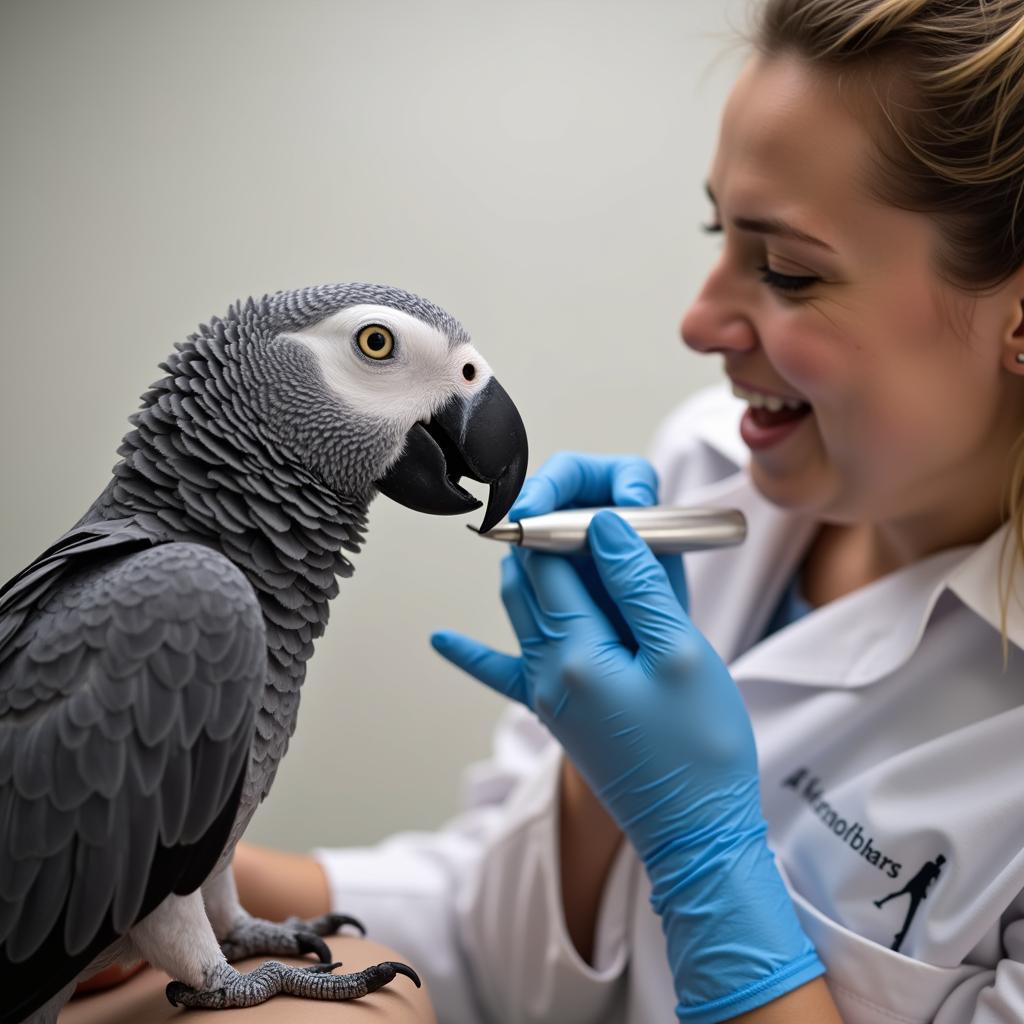African Grey Parrot Treatment: A Comprehensive Guide to Health and Well-being
African grey parrots are renowned for their intelligence, charm, and ability to mimic human speech. As with any companion animal, providing proper African Grey Parrot Treatment is crucial for their physical and mental well-being. This guide delves into the essential aspects of caring for these remarkable creatures, ensuring they live long, healthy, and fulfilling lives.
Understanding African Grey Parrot Needs
To provide the best possible African grey parrot treatment, it’s vital to understand their specific needs, which stem from their wild origins in the rainforests of Central and West Africa.
Nutritional Requirements:
A balanced diet is the cornerstone of good health for African grey parrots. Their natural diet consists of fruits, seeds, nuts, and vegetation. In captivity, a formulated pellet diet should constitute around 60-70% of their intake.
- High-quality pellets: Choose pellets specifically designed for African greys, offering a balanced mix of vitamins, minerals, and nutrients.
- Fresh fruits and vegetables: Offer a variety of fresh produce daily, making up about 20-30% of their diet. Leafy greens, berries, apples, and bananas are excellent choices.
- Healthy seeds and nuts: Provide a small portion of healthy seeds and nuts as treats and enrichment. Pumpkin seeds, almonds, and walnuts are good options.
 Healthy Food for African Grey Parrots
Healthy Food for African Grey Parrots
Housing and Environment:
African grey parrots are intelligent and active birds that require spacious and stimulating environments.
- Cage size: The cage should be large enough for the parrot to fully extend its wings and move around freely. A minimum size of 24″ x 24″ x 36″ is recommended, but larger is always better.
- Perches: Provide various perches of different sizes and textures to exercise their feet and prevent foot problems. Natural wood perches are ideal.
- Toys and enrichment: Offer a variety of toys, such as foraging toys, puzzles, and shredding toys to keep them mentally stimulated and prevent boredom.
- Cage placement: Place the cage in a well-lit area, away from drafts and direct sunlight.
Socialization and Enrichment:
African greys are highly social creatures that thrive on interaction.
- Daily interaction: Spend quality time with your parrot daily, engaging in activities like talking, playing, and training.
- Training: Positive reinforcement training can be a fun and rewarding way to bond with your parrot and teach them tricks and commands.
- Environmental enrichment: Provide opportunities for your parrot to explore outside of their cage in a safe and supervised environment.
Common Health Concerns and African Grey Parrot Treatment
While African grey parrots are generally healthy birds, they can be susceptible to certain health issues. Recognizing the signs and seeking prompt veterinary care is crucial.
- Feather plucking: This can be a sign of stress, boredom, or underlying medical conditions. Consult an avian veterinarian to determine the cause. You can learn more about the potential causes and treatments for feather plucking in African Greys in this article: african grey plucking.
- Respiratory infections: Watch for symptoms like sneezing, discharge from the nostrils, and difficulty breathing.
- Psittacosis (Parrot Fever): This bacterial infection can affect humans, so it’s essential to seek immediate veterinary care if you suspect your parrot is ill.
- Calcium deficiency: Provide a calcium supplement as directed by your veterinarian.
Choosing a Veterinarian for Your African Grey
Finding a qualified avian veterinarian is crucial for your parrot’s health.
- Avian experience: Ensure the veterinarian has experience treating birds, specifically parrots.
- Reputation and recommendations: Seek recommendations from other bird owners or avian organizations.
- Communication and approach: Choose a veterinarian who communicates clearly and handles your parrot with care and respect.
 Veterinary Check-up for an African Grey Parrot
Veterinary Check-up for an African Grey Parrot
FAQs about African Grey Parrot Treatment
Here are answers to some frequently asked questions about caring for African grey parrots:
1. How long do African grey parrots live?
With proper care, African grey parrots can live for 40-60 years or even longer.
2. Why is my African grey parrot plucking its feathers?
Feather plucking can be caused by various factors, including stress, boredom, dietary deficiencies, or medical conditions.
3. How can I prevent my African grey parrot from getting sick?
Providing a healthy diet, a clean environment, regular veterinary checkups, and ample mental stimulation can help prevent many health issues.
4. Where can I find more information on caring for my African grey parrot?
Reputable online resources, avian veterinarians, and experienced parrot owners can provide valuable information.
5. Can African Grey Parrots live in Hyderabad?
Yes, they can adapt well to various climates. For insights on owning an African Grey in Hyderabad, you can check out this link: african grey parrot hyderabad.
Need More Help with Your African Grey?
Providing proper African grey parrot treatment is a rewarding journey that requires knowledge, dedication, and a deep understanding of these intelligent creatures.
For further assistance and support with your African Grey Parrot, you can reach us at:
Phone Number: +255768904061
Email: kaka.mag@gmail.com
Address: Mbarali DC Mawindi, Kangaga, Tanzania.
We have a 24/7 customer support team ready to assist you.


